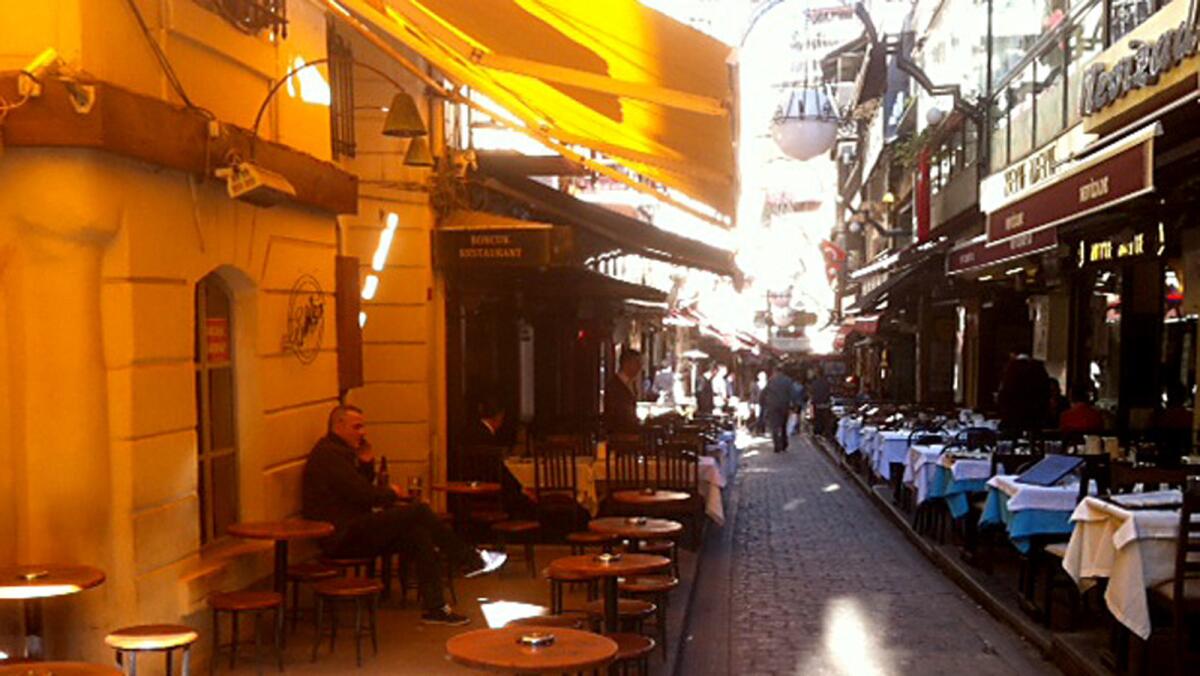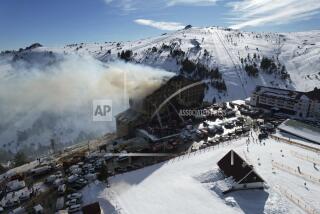Attacks keep crowds from Turkey’s tourist districts

The normally bustling Nevizade Sokak pedestrian mall in Istanbul has seen a dramatic decrease in clientele since a suicide attack March 19.
- Share via
reporting from ISTANBUL, Turkey — Bar staff and restaurateurs look upon rows of empty tables, competing for the few people still walking the labyrinthine back streets of Istanbul’s Beyoglu district, center of the city’s normally humming nightlife.
“People are afraid to come out,” said one waiter, Akin Kul, watching over an empty bar at the end of a pedestrian mall, Nevizade Sokak, famed for its cheap beer and abundance of mezze restaurants. “They think there will be more attacks.”
A string of deadly suicide bombings in Turkey has subdued the people of this iconic mega-city — straddling Europe and Asia — and has raised fears that more assaults are still to come.
Two weeks ago, an Islamic State suicide bomber, Mehmet Ozturk, detonated an explosives vest packed with nails on Istanbul’s Istiklal Street, a stylish boulevard and one of the busiest thoroughfares in Europe, packed with bookstores, restaurants, clothing retailers and masses of wide-eyed tourists.
Ozturk’s blast killed four tourists and injured dozens more.
Throughout the city, normally bustling streets are relatively quiet. In the famous fish market running perpendicular to Istiklal, men selling trinkets and rare stones, glittering Turkish coffee sets and handmade mosaic lamps lament the loss of customers.
“I would estimate that we are selling 50% less since the attack,” said a local jeweler, Mustafa Eren. “People don’t want to get killed.”
Eateries normally packed with locals and tourists alike — enjoying stuffed mussels straight from the shell or fried intestine sandwiches — are nearly empty. Bored vendors sit beside crates of fish and lobster.
Along one popular back street, about 100 yards from the blast site, electronic music pumped at sundown Thursday from a usually crowded, but now empty bar. The beat echoed along the mostly deserted street.
“It is just certain spots in the city that make me concerned, like crowded streets and squares,” said 29-year-old Fatih Yalcin, who is setting up a restaurant in Kadikoy, a liberal area on the Asian side of the Bosporus Strait that has slowly returned to normality over the last two weeks. “I think that feeling will pass in a few weeks, if there is not another attack.”
Ozturk appears to have been linked to the so-called Dokumaci group, a cluster of young extremists radicalized by at least three Islamic State operatives in the conservative city of Adiyaman, in Turkey’s southeast, and in Syrian training camps. Mustafa Dokumaci is believed to be their leader.
The cell, which brazenly recruited at a teahouse in Adiyaman, has carried out at least six bombings across Turkey since June, killing more than 150 people. Experts believe it to be embedded within a much broader network of extremists.
Its most lethal attack so far was the twin suicide bombing of a peace rally in Ankara in October that killed more than 100 people.
It is just certain spots in the city that make me concerned, like crowded streets and squares.
— Fatih Yalcin, 29
The day before the Istiklal bombing, security cameras captured Ozturk in Adiyaman, calmly buying a bus ticket. He was wearing a bulky jacket, had no luggage and was freshly shaved, his hair cropped short.
“I believe the police will be able to stop future attacks,” said Eren, the jeweler. “The police are everywhere now. Maybe 8 out of every 10 people on this street are police officers.”
Turkish Prime Minister Ahmet Davutoglu has called on Turks to take to Istanbul’s streets in defiance of the terrorism threat.
“Let’s go out, more than ever before,” said Davutoglu on Wednesday, according to Turkey’s Hurriyet Daily News. “These streets are ours, these cities, these people are all ours.”
Islamic State is widely believed to have penetrated cities throughout Turkey, establishing sleeper cells, as well as recruitment and smuggling networks, particularly in southeastern cities such as Kilis, Gaziantep and Sanliurfa.
Counter-terrorism police on Friday arrested about 15 members of the group in coastal Izmir, local media reports indicate, seizing documents and shotguns. Dogan News Agency reported that some of those arrested were in training for suicide attacks.
Izmir — a liberal city on the country’s western tourism trail — has become a smuggling hub over the last year. Many hundreds of thousands of desperate refugees use the bays and inlets along its coastal shores to begin hazardous trips to the nearby Greek islands of Lesbos and Chios.
And as Islamic State accelerates its attacks outside Syria, tourists, a vital part of the Turkish economy, are staying away.
Istanbul’s historic district of Sultanahmet, normally bursting with tourists visiting the Hagia Sophia and Blue Mosque, or wiggling through the crowds of the Grand Bazaar, is nearly deserted.
A scattering of tourists snap selfies and wander along streets, past some of the most quintessential symbols of Istanbul. There is a notable police presence.
In January, a Syrian Islamic State suicide bomber detonated an explosives vest beside the Obelisk of Theodosius, an ancient Egyptian monument of red granite, killing 13 people, most of them German tourists.
“Look around, there is no one here,” said tour guide Mehmet Orgun. “Roughly 60 to 70% less tourists than we would have in the spring.”
Members of the group he was guiding, however, said they are not daunted.
“Of course we are saddened by the situation,” said 61-year-old Rick Groger, vacationing with his husband and several other friends from the United States. “But we will not let this interfere with our enjoying Istanbul.”
Johnson is a special correspondent.
ALSO
In Russia, a nice relaxing bath isn’t quite that
Chinese e-commerce giant Alibaba connects rural residents to online shopping
Groups like Islamic State have taken sexual violence to ‘a new level of ... depravity’ in conflict
More to Read
Sign up for Essential California
The most important California stories and recommendations in your inbox every morning.
You may occasionally receive promotional content from the Los Angeles Times.













